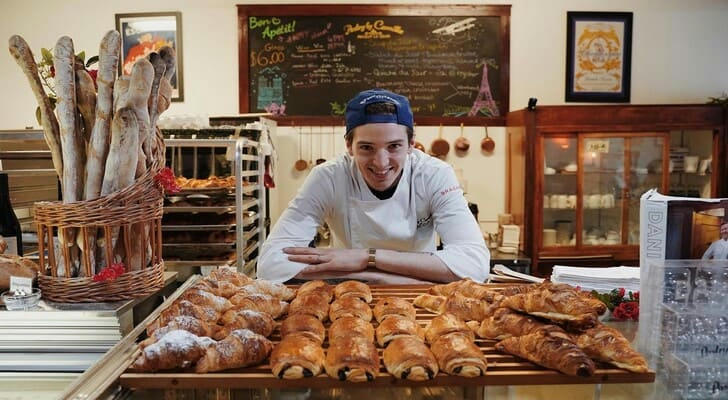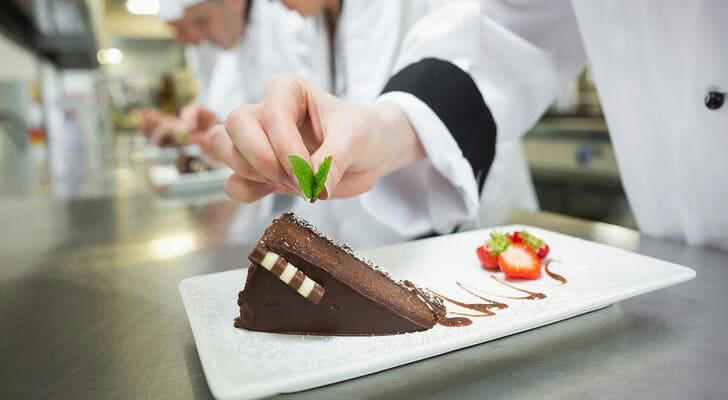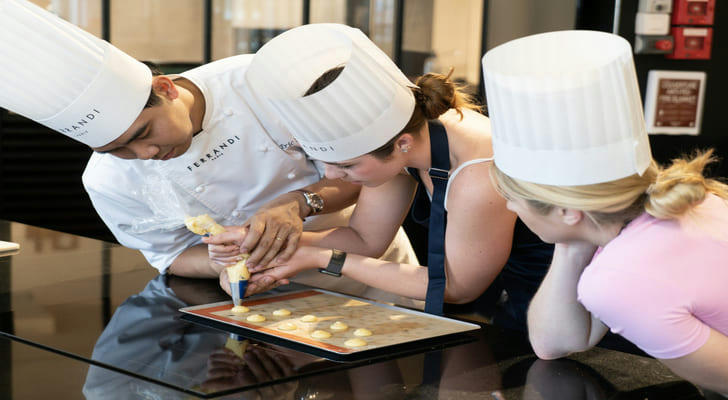Start the growth journey of a professional baker
As baking evolves into an art form that blends creativity and technical skill, cake baking has transcended its role as a kitchen hobby to become a career with immense potential. The U.S. baking education system, renowned worldwide for its structure, innovation, and hands-on approach, attracts countless baking enthusiasts and career changers. This article delves into the core content and unique advantages of American cake baking courses, offering a comprehensive guide for aspiring professionals.

I. Core Curriculum Modules: A Step-by-Step Path from Foundation to Mastery
American cake baking courses are typically structured into multiple levels, covering a complete knowledge system from foundational skills to advanced creativity, ensuring students progressively master industry-critical competencies.
1. Fundamentals of Cake Baking Theory and Practice
Courses begin with the scientific principles of baking, emphasizing ingredient properties (e.g., interactions between flour, sugar, and fats), precise measurement techniques, and the impact of temperature control on outcomes. Under instructor guidance, students practice making classic cake bases such as sponge, pound, and chiffon cakes, refining key techniques like folding, mixing, and baking through repetition.
2. Decorative Arts and Creative Design
This module focuses on aesthetic presentation, teaching techniques like buttercream smoothing, royal icing piping, fondant sculpting, and chocolate carving. Students learn to use tools such as piping tips, molds, and airbrushes to create 3D floral arrangements, cartoon characters, or minimalist modern designs. Color theory and composition principles are integrated to help transform artistic ideas into executable designs.
3. Advanced Themed Cakes and Customization
Aligned with market demands, courses cover seasonal themes (weddings, birthdays, Christmas), health-conscious baking (gluten-free, low-sugar recipes), and 3D sculpted cakes. Students analyze client needs, calculate costs, and develop tailored proposals, honing end-to-end service capabilities from design to delivery.
4. Business Operations and Brand Management
To support professional growth, courses incorporate entrepreneurial knowledge, including storefront location analysis, supply chain management, cost control, and social media marketing (e.g., Instagram content strategy). Case studies teach students how to build differentiated brands and loyal customer bases.
II. Course Advantages: Building Career Competitiveness

The strength of U.S. cake baking courses lies not only in technical training but also in resource integration and industry connections that provide multidimensional support.
1. Expert Instructors and Personalized Mentorship
Faculty often include industry leaders with experience in Michelin-starred kitchens or renowned bakeries, sharing cutting-edge trends and practical tips. Small class sizes (typically under 15 students) ensure individualized feedback to correct mistakes swiftly.
2. State-of-the-Art Facilities and Innovation Labs
Students access professional-grade equipment such as commercial ovens, temperature-controlled proofers, and molecular gastronomy tools, replicating real-world baking environments. Some institutions feature “innovation labs” for experimenting with plant-based creams or hybrid techniques like 3D-printed cake decorations.
3. Industry Partnerships and Internship Opportunities
Collaborations with local bakeries, luxury hotels, and food expos enable internships where top students handle real orders and build portfolios. For example, the California Baking Academy partners with Disney for themed cake competitions, with winning designs potentially going into production.
4. Global Certifications and Professional Networks
Graduates earn certifications from organizations like the American Baking Association (ABA) or Worldchefs (WACS), enhancing employability. Alumni networks span the global baking industry, connecting learners to potential employers or collaborators through association events.
III. Student Outcomes: From Skill Development to Career Transformation
Courses are results-driven, ensuring holistic growth in technical prowess, creativity, and business acumen.
1. Portfolio Development and Final Showcase
Students create a themed cake series (e.g., seasonal or cultural fusion designs) for a graduation exhibition, presenting to industry judges and the public. These works serve as both technical proof and visual resumes for job applications or freelance projects.
2. Career Advancement Support
Institutions offer career services, including résumé workshops, mock interviews, and entrepreneurial consulting. Select courses feature “brand incubators,” providing startup resources like funding guidance and legal compliance assistance.
3. Lifelong Learning and Industry Updates
Post-graduation, alumni access updated online courses (e.g., trending icing techniques), annual masterclasses, and industry summits to stay aligned with evolving trends.
IV. Why Choose Baking Education?

The unique value of American cake baking courses lies in their “technique + artistry + business” trifecta. Whether aspiring to become a patisserie chef, freelance baker, or studio entrepreneur, the curriculum offers tailored pathways. Through intensive hands-on training and industry integration, students transition from hobbyists to professionals within 6–12 months, securing their place in a competitive market.
Conclusion
Cake baking is both a craft and an ever-evolving art. U.S. courses pave a clear career path through structured pedagogy, resource access, and professional mentorship. For those seeking technical mastery or aiming to turn passion into profession, these programs provide the ultimate launchpad.
